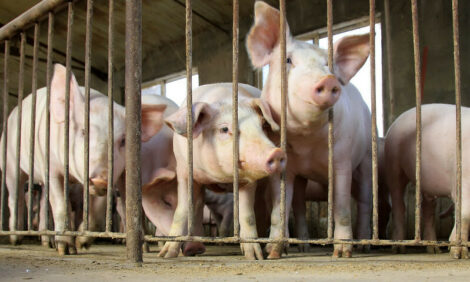



WORLD PORK EXPO: US Pork Producers Must Report PEDv
ANALYSIS – US Secretary of Agriculture Tom Vilsack addressed attendees at the World Pork Expo and announced a new Federal Order for mandatory reporting of porcine epidemic diarrhoea (PED) virus, reports Chris Wright, senior editor, from Des Moines, Iowa.The U.S. pork industry was aware that the new regulation was being contemplated, but Secretary Vilsack (photo) arrived in person and made the announcement to a standing room only crowd of pork producers from across the country and the world.
Along with the mandatory reporting of porcine epidemic diarrhea virus (PEDv) and the porcine deltacoronavirus (PDCoV), the Secretary announced that the US Department of Agriculture (USDA) is providing over US$26.2 million in funds to combat the disease.
Secretary Vilsack noted that the new Federal Order does not require that quarantines be put in place nor imposes any movement restrictions on pigs. The new order does require that the operations reporting the viruses work with their veterinarians or with the USDA to implement a management plan that will prevent the further spread of the disease.
He pointed out that in the last year PEDv has killed around seven million piglets and caused a 10 per cent loss of market ready pigs in the US.
Secretary Vilsack reminded the audience that one year ago there were 100 producers affected by the virus, and today that number has grown to 4,700 operations.
The Secretary also emphasized that PEDv does not affect human health, it is only a pig disease, and it does not impact food safety in any way.
In announcing the measure, he said that the USDA understands that the new regulations will have an economic impact on those producers that report the disease, and therefore funds would be made available to them.
Funding Available
Specifically, the $26.2 million in funding for PEDv will be allocated in the following way:
- $3.9 million to the Agricultural Research Service (ARS) for vaccine development (which the Secretary said was the top priority at this moment)
- $2.4 million for States to support management and control activities
- $500,000 to herd veterinarians for herd management plans, sample collection and monitoring
- $11.1 million in cost-share funding for producers of infected herds to support biosecurity practices
- $2.4 million for diagnostic testing. and
- $1.5 million to the National Animal Health Laboratory Network (NAHLN) diagnostic laboratories for genomic sequencing for newly positive herds.
While the mandatory reporting order for PEDv and new swine coronaviruses goes into effect immediately, it will take about a month to really get the whole process going.
Not Setting a Precedent
The Secretary stated that no one should assume that this new Federal Order is setting a precedent for the future. A great deal of thought was put into how to deal with this very critical situation for the US pork industry and was deemed appropriate for now. It does not in any way mean that this is how new animal disease outbreaks will be dealt with in the future.
He emphasized that in the case of PEDv there is no pathway and no vaccine. We need to keep this disease on the farm, but we also need to know how it got there. That is why it is important to keep funding research (which the pork industry itself has been doing so far).
He also mentioned, several times, that there needs to be a focus on border surveillance and detection to prevent new diseases like PEDv from entering the country.
Secretary Vilsack said he understands that pork producers may not be happy with the new Federal Order, but stated that this is only a reporting requirement, and he does not feel it is a heavy handed measure. He believes that the producers will comply because there is funding available to help them. He pointed out that there has been a great deal of cooperation between the government and producer groups since the outbreak began a year ago, to try and get PEDv under control.







